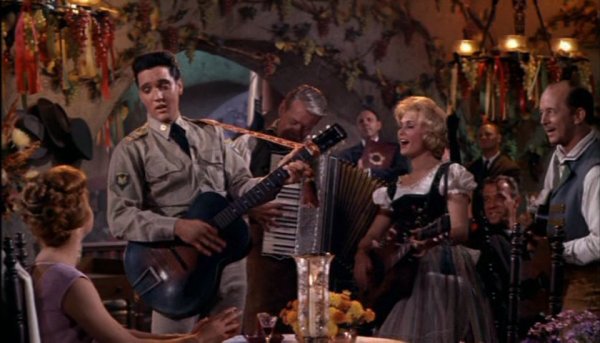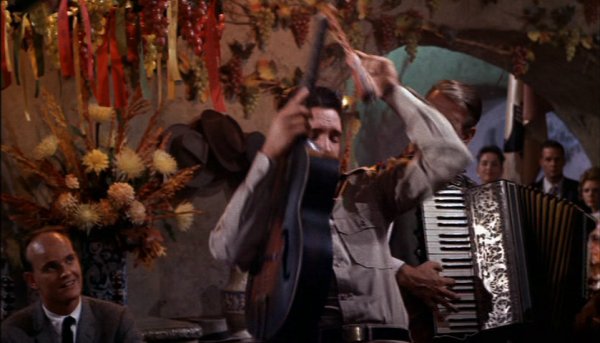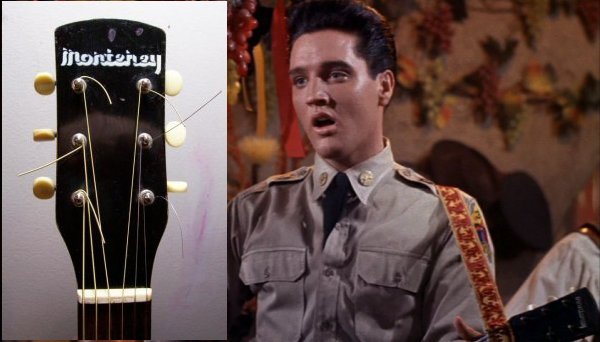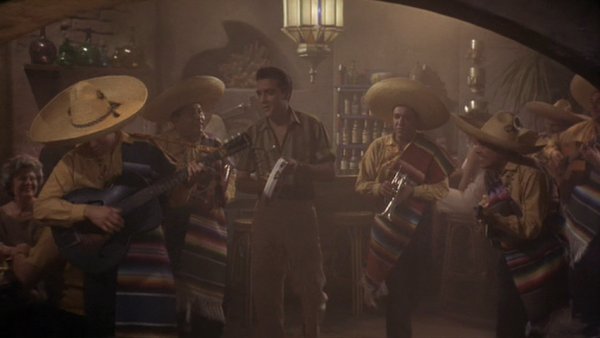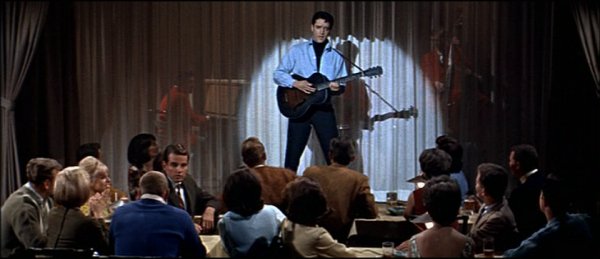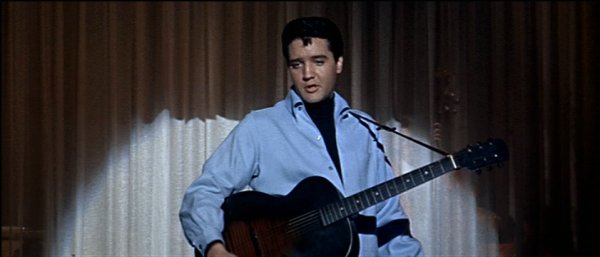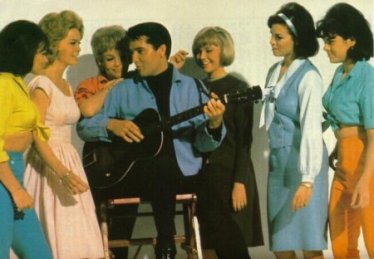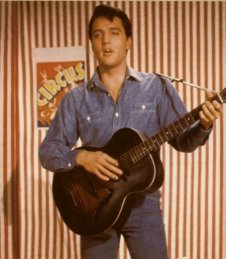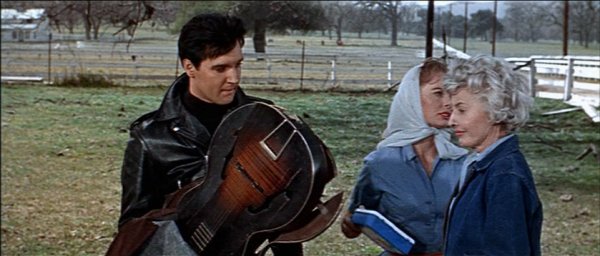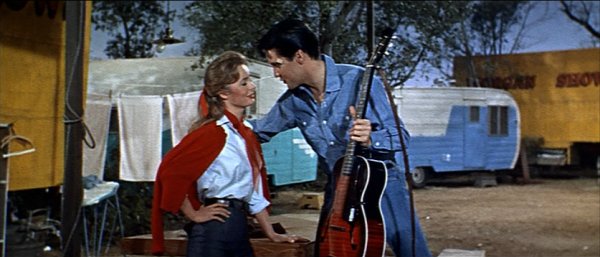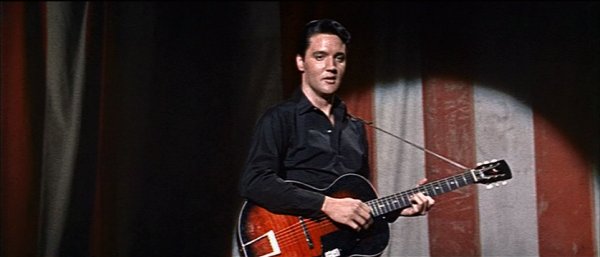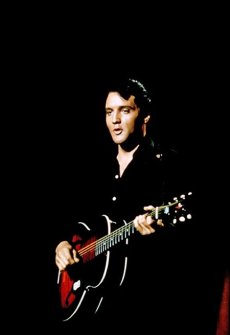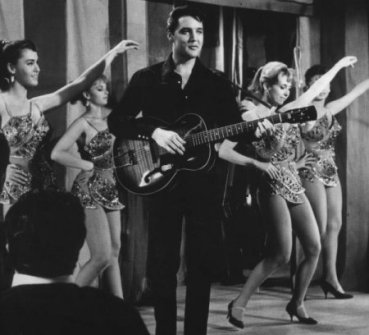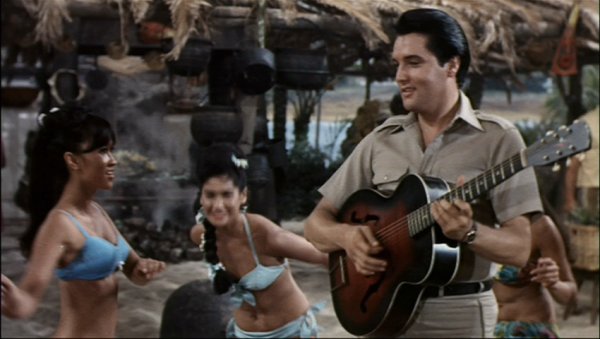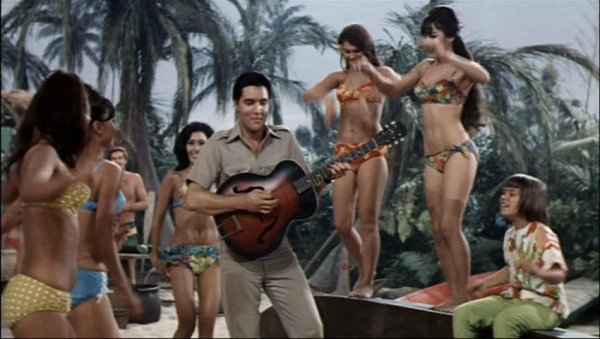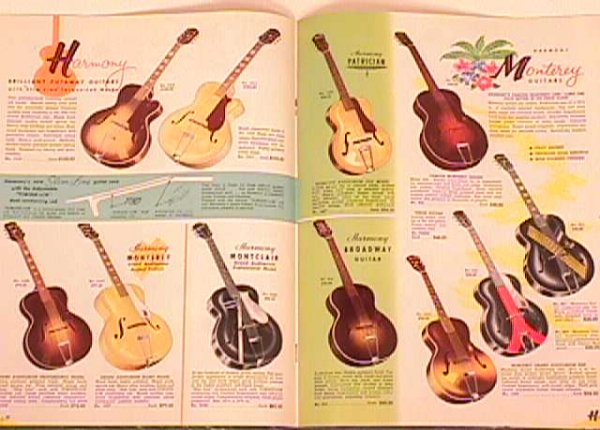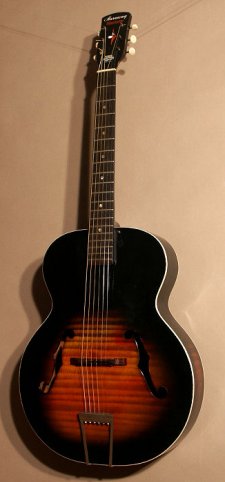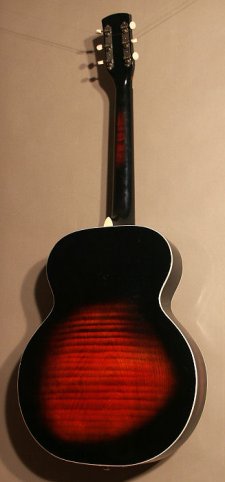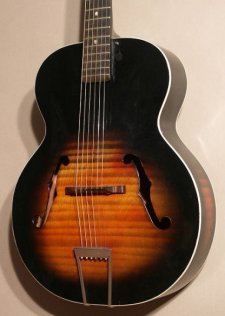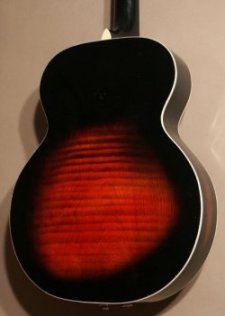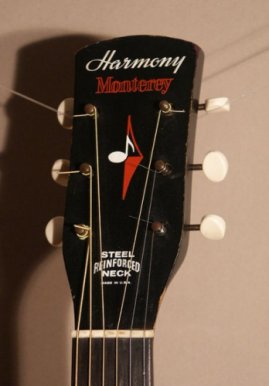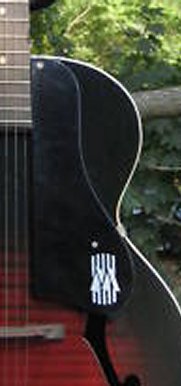 |
Harmony H950 - Monterey Leader(s)
Paramount's 1960 release of G.I. Blues, was Elvis' fifth movie, his third for Paramount and his first after returning from the Army. Cast as a soldier stationed in Germany in the same unit as the one he actually served in, his love interest in the film was Juliet Prowse. In one scene he borrows a guitar and serenades her to the song Tonight Is So Right For Love which, due to copyright issues, was replaced in several European countries with another song called Tonight's Alright For Love.*
In the scene, Elvis is playing a Harmony Monterey Leader (H950) archtop guitar, sans pickguard, with an extremely dulled or over sprayed finish. The logo on the headstock appears to be consistent in style and design to another Monterey model, a 1942 H989, and the single binding on the top of the guitar only also suggests it to be of that era.
The same Monterey (and strap) is later seen in several scenes of the 1963 release of Paramount's Fun in Acapulco, though never played by Elvis. Elvis, cast as a Circus trapeze artist working in Mexico as a lifeguard/entertainer while he deals with his fear of heights, in fact doesn't play any guitars in this film at all. The Monterey though, and others he has used, are pictured played by other actors in the varied musical settings throughout the film.
Production began on Paramount's 1964 release of Roustabout in January of that year. Produced again by Hal Wallis, this was Elvis' sixteenth movie and seventh with that studio. In the film, which also stars Barbara Stanwyck, Joan Freeman and Leif Erickson, he plays a singer and motorcyclist committed to working for and with a carnival while waiting on repairs to his motorcycle after he's run off the road by the carnies.
In scenes from the movie Elvis is pictured with two different Montereys. The first appears to be the same 1940s model used briefly in G.I. Blues though with the headstock completely blacked out, and then a new '60s model complete with the pickguard in a scene where he sings "One Track Heart." Only the name in the logo on the headstock is blacked out on that one. The first Monterey is destroyed as part of the plot as a result of the motorcycle accident.
In the story, in addition to repairs to his motorcycle, they replace his guitar with the new Monterey. In Paramount's 1966 release of Paradise, Hawaiian Style, Elvis' twenty-first film, he plays a former airline pilot who has recently partnered with a friend in an Island helicopter transportation/touring service. Production began in the summer of 1965 and location shooting took place in Honolulu, Kauai and Maui.
In one scene where Elvis performs he is again seen playing what appears to be the newer Monterey Leader from Roustabout. By then the pickguard had been removed, the headstock more blacked out and the finish dulled. This would be the last of the films set and filmed on location in Hawaii. Though Easy Come, Easy Go would be the next and last film made with Paramount, Paradise, Hawaiian Style is also the last time any of the Harmony Monterey guitars were used in any of his films.
The Monterey was just one line of many that were produced by the Harmony Company in Chicago. Their instruments also carried many brand names and their archtops were constructed from hardwoods, with either mahogany, spruce or birch tops, depending on the model, and were pressed as opposed to carved.
The H950 Monterey Leader was one of the most popular archtops of the sixties and were produced from approximately 1938 to 1972. The Monterey line were "Auditorium size" at 41" x 15.75" with a 25.25" scale length. The necks were steel reinforced basswood with an oval ebonized fingerboard and a bone nut.
The bodies, top, back and sides were well seasoned birch (pressed not carved) with white celluloid binding in the top in the 40s and top and back by the 50s (early models had a lower fretboard and bridge, and painted white bindings). They had black celluloid pickguards, an adjustable bridge and nickel plated tailpieces. They were finished in a highly polished black and red burst with faux flame maple figuring. They listed for $16.50 in 1940, $46.00 in 1957, $54.50 in 1966 and $69.50 by 1970.
These are among the most popular inexpensive guitars ever built. The H950 Monterey Leader archtop was also sold as an Alden 9937, Barclay H1218, Custom Kraft H1222, Esquire ES6032, Holiday AL9290, SS Stewart 4008 and SS Stewart 4009. The Harmony Guitar Co. in Chicago continued to turn in impressive annual sales figures right up till it ceased operations in 1975. Later in the 70's the Harmony name was sold to be used on Asian guitars. This page added August 15, 2010 is part of the section The Movie Guitars of Elvis Presley. Much of the specifications for Monterey models was obtained directly from several sources on the web but primarily the Harmony guitars database.
* courtesy Elvis
Presley Film Society |
|
All photos on this page unless otherwise indicated are the property of the designated persons or company, any unauthorized use or reproduction is prohibited. |
